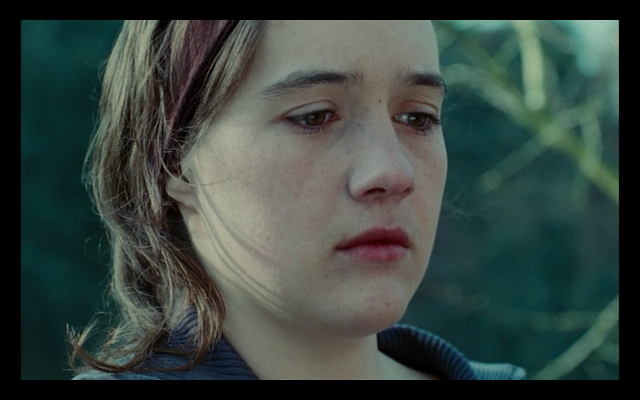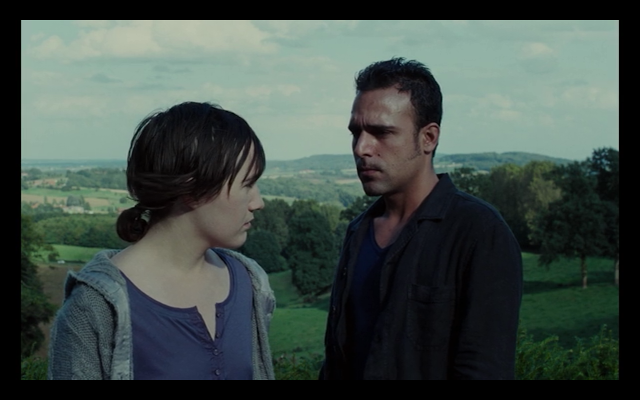Where did she come from, Julie Sokolowski? She plays Céline vel Hadewijch, the movie's lead. I can see her soul through her eyes, her face is an emotion.
When her face is absent, I think of seeing it.

I can't think of her 'neutral' expression, she seems always in some thought or feeling,

drawing some thing out of herself for the moment,

or searching for a thing,

or hiding,

or absorbing;
her face can crush me, I become destroyed with it,

because Céline's emotions become mine,

and I want so badly for her to have the good ones only.

But, life as it is, one takes the good one can get.
When the movie begins Céline is studying to become a nun, and her psycho love for Christ worries her Mother Superior, who kicks Céline from the monastery. Still lost in a blindlove for Christ, but taken from that love's context and made to reenter the reality of Paris, Céline searches for a way to fuse with Christ.
It's a romance story where the girl is unable to be with her love. Her father is a Professional Christian (minister), and her parents think she's home waiting for exam results. The audience knows of the tension between Céline and her father not because the movie stresses it through repetition, but because the only time Céline says a critical thing about a person is when she talks about her father ("jerk"), to her friend Yassine (Yassine Salime), whom she meets in a Paris cafe. At a concert along a river,

Yassine makes a move on Céline, before he knows better.

He likes her as a friend, but doesn't understand her all the way.
His brother Nassir (Karl Sarafidis), a devout Muslim, gets her.
Nassir has ideas about where Céline can direct her love for Christ. Though they practice different religions, they relate on mutual grounds of psycho-passion for God.
The movie makes the case that belief is a shared characteristic which becomes categorized by the particulars of religion.
This is Bruno Dumont's fifth movie, from 2009. I hadn't seen a movie of his since his debut, 1997's The Life of Jesus, a good movie, but I was amazed by the growth Dumont has made. He's a moviemaker who continues the exploration of the human soul through the art of cinema, and his Hadewijch has the soul-puncturing efficacy of honest and brave movies.
And I'm not referring to Dumont's bravery in confronting controversially extreme emotions -- that controversy will fade, and what lasts of that particular brand of bravery -- I'm referring to his cinematic quest to expose the interior truth of Céline. It's brave of a moviemaker to care about his lead so much that I'm overwhelmed by a desire to talk about the lead, instead of the moviemaker, and I seem unable to separate the emotions of the lead from the emotions of the movie. Dumont has made himself as invisible as possible; all his cinematic techniques are intended to focus the emotions of Céline. His technique burrows inward.
And by witnessing a movie burrow into itself, I begin to burrow into myself. Hadewijch is a movie I've carried in my thoughts (there are a surprising number of emotions and moments to recall, though the narrative feels 'loose'), and in my thoughts the movie has continued to grow in meaning and emotion.













































